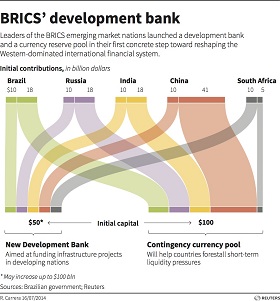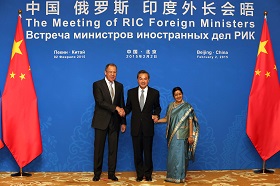What we have is government
controlled by a few giant corpo
-
rations, and they got their power
by acquiring the power to create
the national money supply.
“If Congress has the right under the Constitution to issue
currency [paper money], it was given to them to be used
by themselves, not to be delegated to individuals or corpo
-
rations.” —
President Andrew Jackson
“Whoever controls the volume of money in any coun
-
try is absolute master of all industry and commerce.”
—
President James A. Garfield
“All the perplexities, confusion and distress in America
arise, not from defects in the Constitution or confedera
-
tion, not from want of honor or virtue, so much as from
downright ignorance of the nature of coin, credit and cir
-
culation.” —
President John Adams
“The Federal Reserve bank buys government bonds with
-
out one penny...” —
Congressman Wright Patman,
Con
-
gressional Record, Sept 30, 1941
“Some people think the Federal Reserve Banks are the
United States government’s institutions. They are not
government institutions.They are private credit monopo
-
lies which prey upon the people of the United States for
the benefit of themselves and their foreign swindlers.”
—
Louis T. McFadden,
Chairman of the Committee on
Banking and Currency, 1932
• The power to create money in our nation has been
usurped by a private international banking cartel, which
issues our money as debt and lends it back to us at
interest.
• Governments get blamed when things go wrong; but
they are actually just pawns of the cartel.
• We the people can get back our government and our
republic only by reclaiming the power to create our
own money. We can use the same credit system that
private banks use, but administered as a public utility,
monitored and overseen by public servants.
• To be a sustainable system, profits need to be returned
to the community rather than siphoned off into private
coffers.
• We have faith in the government “of the people, by the
people, and for the people” set out in the Declaration of
Independence and described by Abraham Lincoln. But
what we have is government controlled by a few giant
corporations, and they got their power by acquiring the
monopoly on creating the national money supply.
• “Allow me to issue and control a nation’s currency,”
Amschel Mayer Rothschild allegedly said in the 18th
century, “and I care not who makes its laws.”
That last statement may be apocryphal, but that is how
they did it, and that is the power we have to take back if
we want a just and trustworthy government that repre
-
sents people rather than wealthy corporations.
—
Ellen Brown,
attorney, Chairman of the Public Banking
Institute
and
author of
Web of Debt
(www.webofdebt.com)
“The powers of financial capitalism had another far
reaching aim, nothing less than to create a world system
of financial control in private hands able to dominate the
political system of each country and the economy of the
world as a whole.”—
Prof. Caroll Quigley,
Georgetown
University, and author of
Hope and Tragedy.
The Public Banking Institute (PBI) is a non-partisan think-
tank, research, and advisory organization dedicated to ex
-
ploring and disseminating information on the potential utility
of publicly-owned banks, and to facilitate their implementa
-
tion. Through its consolidated corporate business model, the
actions of a banking industry, dominated by the “money cen
-
ter” banks of the Federal Reserve, have precipitated the eco
-
nomic imbalances now witnessed across the US economy.
PBI seeks to explore the possibilities for, and to facilitate the
implementation of, public banking at all levels - local, region
-
al, state, national, and international. Its approach is informed
by the historic role of public banks, in the U.S. and elsewhere,
in fostering access to cheap and readily available credit for
governments, businesses, and individuals, particularly with
respect to creating productive capacity.
www.PublicBankingInstitute.org
“It is well that the people of the nation do not
understand our banking and monetary system,
for if they did, I believe there would be a
revolution before tomorrow morning.”
—Henry Ford, Ford Motor Co.
“Well, we’re starting to understand and this is
the beginning of the revolution...the banking
revolution.”
—Ellen Brown, Occupy LA Teach-In












 Danske Bank
Danske Bank



